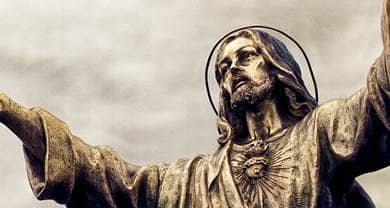- Trending:
- Pope Leo Xiv
- |
- Israel
- |
- Trump
- |
- Social Justice
- |
- Peace
- |
- Love

RELIGION LIBRARY
Lutheran
Early Developments
Lutheranism spread quickly in Germany following Martin Luther's debate with the Roman Catholic Church over indulgences in 1517 because the core of Luther's theology-a liberating sense of God's forgiveness and grace-struck a chord with many of Luther's contemporaries. Following Luther's death in 1546, Lutheranism underwent three important developments. The first, in the 16th and 17th centuries, goes by the name Protestant Scholasticism or Protestant Orthodoxy. The second, in the 18th and 19th centuries, resulted from the influence of rationalism. Finally, also in the 18th and 19th centuries, the development of pietism influenced Lutheranism.
After Luther's death (1546), his colleague Philipp Melanchthon (1497-1560) adjudicated a series of disputes about the proper interpretation of Luther's theology. The result of these disputes as a whole was a shift in the tenor of Lutheranism, from an experience of grace to an emphasis on correct doctrine. For example, John Agricola (ca. 1494-1566) argued that Luther's understanding of the Gospel meant doing away with the law as a means to salvation. Agricola took this to an extreme that is called antinomianism ("against the law"), contending that one had no obligation to fulfill the law and even that good works were detrimental to salvation. (This disregards Luther's view that, while good works do not earn salvation, the justified Christian, filled with the Spirit, will perform works of love for his or her neighbor.) In opposition, George Major (1502-1574) insisted that, while God alone justified humans, good works were necessary for salvation. (This too clearly contradicts Luther.) Melanchthon acted as a mediator in the controversy, suggesting that while one could not say that good works were necessary for salvation, one could say that good works were necessary. While this does not distort Luther's position, neither is it in the same spirit. For Luther, doctrine was never considered independently of a genuine relation to faith.
Similar disputes arose over the proper relationship of the church to civil government, free will, and the way in which Christ was present in the sacrament of the Lord's Supper. One party, which called itself the "Gnesio-Lutherans" (or "genuine Lutherans"), accused Melanchthon of being a "crypto-Calvinist" and Philipp Melanchthon's supporters were dubbed "Philippists." Melanchthon was less concerned to draw sharp theological lines than some of his Lutheran colleagues. He proposed language for the Augsburg Confession that said that in the Lord's Supper the body and blood of Christ were "truly exhibited" (the original creed said "truly present"). The words spoken at the moment of consecration, "This is my body . . .", meant to Melanchthon that the body and blood of Christ were received in the elements, not necessarily that the bread and wine were the body and blood. This flexibility in doctrine allowed Melanchthon to reach common ground with Calvin on the Lord's Supper.
These doctrinal debates seemed to fall back into a kind of logical hairsplitting that Protestants associate with medieval Catholic theology, and they contributed to warfare between various sects. This was followed by a movement called rationalism arose. Rationalism was part of the 18th-century European period called the Enlightenment. The Enlightenment had a higher opinion of human reason and goodness than Luther and the other Reformers. It was the period when new methods of determining truth (the scientific method, for example, as well as a modern historical approach to ancient documents such as the Bible) began to challenge traditional methods. It was the period when people began experimenting with self-government of the people (for example, on the North American continent, and in the French Revolution). Luther and his colleagues were not against the use of reason itself, only against the use of reason apart from faith in God.
Rationalists focused on what all humans, apart from specific revelation or confession, could know was true. They argued that all religions shared the same core ideas, one of which is that the key part of religion is moral behavior. The special revelations claimed by some groups (Luther's claim to the Gospel promises, for example) were seen as true insofar as they agreed with these core ideas, but less important than the core idea, and dangerous insofar as they separated people into confessional camps. Note that, while rationalists disagreed with the Philippists and Gnesio-Lutherans on almost everything, they all agreed that religion was primarily a matter of determining and following correct beliefs.
In response to both Protestant Scholasticism and rationalism, a very influential movement in Germany developed in the 18th and 19th centuries called pietism. Its originators are Philip Spener (1635-1705) and August Franke (1663-1727). These men developed small cells called "collegia pietatis," or "associations of piety." These were not separate from the Lutheran church, and both men required their followers to remain within the Lutheran church. They were small groups that met for Bible study and prayer. The point was not merely increased understanding, but the practical effects of Bible study on believers' lives. Their intention was to act as a leaven for the church, to infuse it with spiritual life. One pietist, Count Zinzendorf (1700-1760), offered his estate in Moravia as a place of refuge to a persecuted sect from Bohemia that had been founded by Jan Hus (1372-1415). (A century before Luther, Hus had embraced some of what were to become key doctrines of the Protestant movement. These disciples of Hus had immigrated to Germany, where they were given safe haven by Zinzendorf.) This is the origin of the Moravian church. The pietists soon took control of the faculty of the University of Halle, which became a major training ground for pietist ministers and theologians.










